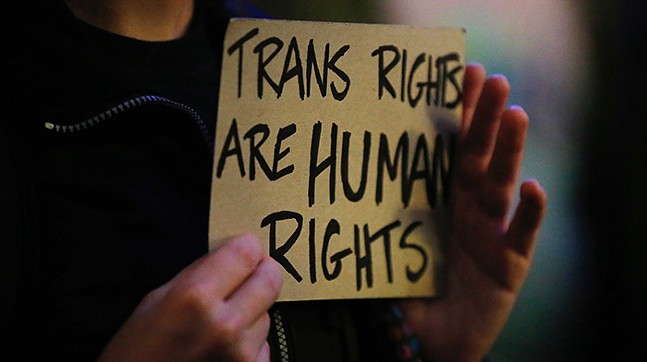The last four years have taken their toll on the mental health of LGBTQ people in the United States. There have been ups and downs. LGBTQ people received workplace protections thanks to the U.S. Supreme Court, but the Trump administration has also rolled back federal health care protections for trans people, banned trans Americans from serving in the military, and allowed adoption and foster agencies to discriminate against gay and lesbian couples.
This, in addition to the distress caused by the COVID-19 pandemic, has contributed to a mental health crisis throughout the country's LGBTQ community, particularly among young people.
In July, The Trevor Project, an organization focused on suicide prevention and crisis intervention, released the findings of a 2020 national survey of 40,000 LGBTQ youth. The survey found that 40% of respondents “seriously considered” attempting suicide in the past 12 months, and 68% reported symptoms of generalized anxiety disorder. The survey also reflected that many LGBTQ people, particularly those who are trans or nonbinary, attribute mental health decline to discrimination, harassment, threats, or violence they had experienced, as well as current events (an overwhelming 86% said politics negatively impacted their well-being).
In a press release from October, Dr. Amy Green of The Trevor Project, says the higher rates of “suicidal thoughts, plans, attempts, and serious injuries” among Black LGBTQ youth was especially alarming.
“It is clear that youth who hold marginalized identities, like those who are Black and/or LGBTQ, are particularly susceptible to poor mental health outcomes and suicidality, and deserve increased attention from prevention and response programs,” says Green.
These statistics are worrisome, not only on a nationwide level, but on state and local level, as Pennsylvania still lags in terms of LGBTQ rights and protections.
As a result, many organizations and nonprofits, including The Trevor Project, are addressing the mental health issues affecting the LGBTQ community by offering access to therapy, counseling, suicide prevention services, and more. Others help by giving LGBTQ people the resources and support to escape or avoid situations that directly contribute to thoughts of suicide or self harm.
Mental health resources for LGBTQ Pittsburghers
Planned Parenthood of Western Pennsylvania offers confidential therapy and services for everyone through The C.A.R.E Program, with the website ensuring an inclusive space for “trans individuals,” “nonbinary folks,” and people who identify as gay, bisexual, pansexual, lesbian, and queer. Sessions are offered at a sliding scale for those without insurance or with limited means.
There are also a number of local and national hotlines LGBTQ people can call for help, especially if they're experiencing suicidal thoughts. Through a partnership between Allegheny County and UPMC Western Psychiatric Hospital, the free Resolve crisis service line can be reached at 1-888-7-YOU-CAN (796-8226), which puts Allegheny County callers in touch with trained clinicians. Resolve also offers a walk-in center and mobile crisis team.
The national Trans Lifeline offers emotional and financial support to trans people in crisis by putting them in touch with trans peers (877-565-8860). The Trevor Project has a few safe, confidential ways for LGBTQ youth under the age of 25 to find help, including the TrevorLifeline (1-866-488-7386), TrevorChat instant messaging service, and TrevorText (text START to 678-678).
A variety of local organizations specialize in mental and behavioral care for LGBTQ individuals. Persad Center (persadcenter.org), Central Outreach Wellness Center (centraloutreach.com/services/mental-health), and Allies for Health and Well-Being (alliespgh.org/clinic-services) all focus on the mental health and well-being of Southwestern Pennsylvania’s LGBTQ population.
Black people in the LGBTQ community can also find Black-led services more tailored to their mental health needs and concerns. Duane Binion and John Easter, co-founders of True T PGH (truetpgh.com), say that offering specialized spaces is essential, adding that “seeking therapy as an LGBTQIA+ person of color in Pittsburgh can often feel like such a daunting and impossible task.”
“Therapy is something that is not publicly talked much about and/or frowned down upon across most communities of color, as we have been socially trained to believe that the mere thought of one seeking mental and/or therapeutic treatment is a sign of weakness,” they explain in a joint statement.
In addition to arts and entertainment and social activism, Binion and Easter stress that True T PGH serves LGBTQ communities of color through “meaningful resource sharing,” as well as providing emergency support with care packages and financial assistance.
Additionally, True T PGH has also “established strong relationships with some of Pittsburgh's top LGBTQIA+ friendly health care providers.” They also highlight Trans YOUniting (transyounitingpgh.org), a Black and trans-led organization focusing on emergency services for trans and nonbinary people, and PROUD Haven (proudhaven.org), which finds emergency housing for LGBTQ youth.
Housing is also a priority for SisTers PGH (sisterspgh.org), a local Black and trans-led organization that serves transgender and gender non-conforming youth, with a focus on transgender women of color. Lack of stable or safe shelter is a major stressor for LGBTQ people, with circumstances ranging from being discriminated against by rental companies or landlords, to not feeling welcome in homeless shelters. Many LGBTQ youth are also kicked out of their homes or leave because of homophobic or transphobic family members or caregivers.
True T PGH addresses the issue with its OPTION-U emergency housing program.
Binion and Easter say while the LGBTQ health care in Pittsburgh has broadened over the past few years — pointing out how the city went from one provider to several — more still needs to be done.
“It is important that we start to intentionally diversify our medical centers,” they say. “Community members need to see people who reflect on themselves to sometimes feel more comfortable and engaged when entering these spaces.”



